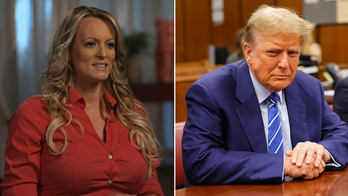Obama Celebrates China at Perilous Moment
“65 percent”
-- The portion of Americans who see China as an “adversary” or a “serious problem” in a new Pew Center poll.
President Obama’s policy of diplomatic engagement is in the midst of its greatest test yet.
While Obama’s predecessors withheld the full trappings of a state visit from Chinese leaders in the past, the president is pulling out all the stops – a private dinner, a meeting with business leaders, a 21-gun salute, a state dinner featuring everybody from Jackie Chan to Energy Secretary Steven Chu and a joint press conference.
A state visit is generally a reward for allies. Seeing a leader celebrated in Washington in such a way suggests great status at home and in the international community. These are the trappings of power that make up global status.
Previous presidents welcomed China’s leaders, but not in such grand fashion. As long as the communist government supported human rights abuses, kept its markets closed and threatened its neighbors, a state visit was deemed unseemly.
At this moment, China is acting out in all of these areas in a big way. Political imprisonment is still common, individual rights are non-existent, Chinese hackers are suspected of stealing plans to a next-generation U.S. Air Force fighter, the Chinese military is making an active effort to end 60 years of American naval dominance in the Pacific and the country has been pushing around smaller players in its region.
And, the country has rejected calls to open its markets and is unabashedly seeking to knock off the dollar as the world currency.
But, in Obama’s new brand of foreign policy, the visit is intended to foster greater understanding in an effort to work on some of those problems. It is not a reward, but an enticement to deeper cooperation.
But this comes at a political risk. Americans are decidedly wary of China’s rise and may not be happy to see Obama rolling out the red carpet for Hu. And as Obama has found elsewhere in the world, particularly with Iran, the engagement approach does not always yield results.
Goldman Sachs Back on the Inside Tracks at the White House
“Goldman Sachs has a very significant presence in China built from the ground up over many years.”
-- A Wall Street executive explaining to FOX Business the rationale for including the investment firm’s CEO in a meeting with China’s president.
Less than six months after paying the largest fine in Securities and Exchange Commission history – a $550 million penalty to settle fraud charges – Goldman Sachs seems to be back on the inside track with the Obama administration.
Today, CEO Lloyd Blankfein will be one of 14 CEOs invited for a private meeting with President Obama and Chinese President Hu Jintao.
And on Tuesday, the Obama SEC announced that Eileen Rominger, head of investment management for Goldman Sachs and an 11-year veteran of the company, would now be in charge of regulating investment management for the government. While Rominger has won praise for her acumen, the move violates the onetime Obama pledge to stop the “revolving door” from the private sector to government regulation.
Earlier this month, Obama tapped highly paid Goldman consultant Gene Sperling to be his highest-ranking economic adviser. Sperling replaces Larry Summers, who was criticized for his $135,000 payment for a one-day visit to the firm in 2008, called an “advance bribe” by liberal pundit Glenn Greenwald.
It was just April of last year that Washington cringed at the revelations from hearings on Goldman Sachs’ involvement with the mortgage meltdown. Congress heard how the firm was encouraging investors to buy mortgage-backed securities even as Goldman was using its own money to bet on failure.
That was also when America met Fabrice Tourre and other Goldman executives whose emails revealed an unpleasant corporate culture that laughed at investors. Tourre famously called the mortgage investments “a product of pure intellectual masturbation.”
Goldman has been on aggressive push to improve its corporate image since the hearings and the subsequent fraud charges in an effort to get back in the good graces of the White House.
Remember, Goldman executives gave Obama nearly $1 million for his 2008 campaign, making the controversial firm the campaign’s largest corporate patron.
Also attending the meeting today with Hu will be another key corporate ally of Obama, GE’s Jeffrey Immelt, whose firm just won approval from the administration for a plan to dump NBC in a deal with cable giant Comcast.
With his campaign aiming for a $1 billion war chest for Obama’s reelection bid, the executive suites at GE and Goldman will be prime targets for Obama fundraisers. And with a New York Times report today that says Goldman’s 860 partners received $30 billion from stock sales over the past 12 years, it’s a good place to put their crosshairs.
Dems Try to Absorb GOP Health Law Blows
"I'm willing and eager to work with both Democrats and Republicans to improve the Affordable Care Act. But we can't go backward."
-- President Obama in a statement opposing Republican efforts to repeal his national health care law.
Do Democratic House leaders Jim Clyburn, D-S.C., and Steny Hoyer, D-Md., and President Obama really want to reopen the discussion on health care right now?
Probably not, but all three have spoken encouragingly about efforts to alter the landmark legislation passed 10 months ago. After spending most of the first half of his presidency getting the sucker passed, Obama particularly wouldn’t like to see health care interfere with his “hard pivot” to the economy.
But, Democrats are looking to cast themselves as the moderates in health care debate. While Republicans want to go all the way and repeal the law, as they will vote to do in the House today, Democrats are offering to “improve” the law. This feeds the mainstream press narrative of “extreme” Republicans and shows the president ready to work across the aisle.
Defending the status quo on the unpopular bill (just 13 percent liked the law in a Gallup poll this week) isn’t an option, but by offering to consider changes, it allows Democrats to play for time as the estimated 10,000 pages of new regulations needed to put the law in place are completed.
Some Democrats have expressed a willingness to look at huge changes to the plan, including doing away with the provision that requires all Americans to buy private insurance or be enrolled in a government program. These are central changes that threaten the very existence of the law.
What Obama, Clyburn and Hoyer are talking about are tweaks to the law that would provide political cover as the rules move forward.
Plus, Obama Democrats are eager to cast Republicans in the role of Britain’s Conservative Party as the guys who are always looking for stingier benefits. While Republicans are currently debating whether the government should run American health care, Obama, Hoyer and Clyburn would like to shift the discussion to how the government should run American health care.
It matters a great deal because as today’s repeal vote in the House will show, many Democrats are looking to get far away from the law. If the president can show that he and his team are willing to change it, they might prevent a stampede of moderates in the Senate toward more drastic measures.
Power Play prediction: Nancy Pelosi will have to hustle today to keep Democratic defections in the House to single digits.
2012 Senate Map Stinks for Democrats
“He believes it's time to open a new chapter.”
-- An aide to Sen. Joe Lieberman confirming to FOX News that the Connecticut independent will announce today that he will retire rather than seek reelection in 2012.
Two members of the Senate Democratic caucus have already bowed out of 2012 runs.
It’s all bad news for Democrats as North Dakota’s Kent Conrad hangs it up. The state had a strong prairie populist streak until recent years, but in 2010 saw retiring Sen. Byron Dorgan replaced by Republican John Hoeven and incumbent statewide Rep. Earl Pomeroy knocked off by Republican state legislator Rick Berg.
With many potential Republican candidates, including state Tax Commissioner Cory Fong and new Gov. Jack Dalrymple, the GOP is looking at a likely pickup here.
In Connecticut, it’s complicated.
Sen. Joe Lieberman, I-Conn., is expected to announce his retirement today, and while Republicans don’t have such high hopes in the deep blue state, they do have some plausible potential candidates in near-miss gubernatorial nominee Tom Foley, Linda McMahon and some former GOP House members.
Democrats, though, have an advantage on political climate, but lack a strong bench right now. New Sen. Richard Blumenthal, D-Conn., had high numbers and a 20-year career in statewide politics before he started his run.
Secretary of the State Susan Bysiewicz, who ditched a run for governor last year, has declared, but did so when she foresaw a three-way race with a GOPer, Independent Lieberman and herself. Bysiewicz ran for state attorney general last year, but was declared ineligible because of she lacked the requisite years of legal practice in the state.
But remember, Republicans need only win four seats to take control of the Senate. And with 23 Democratic seats up next year, there are many opportunities to get there. With North Dakota, West Virginia, Virginia, Nebraska, Florida, Missouri, Montana and Ohio all voting, four seems like a pretty reasonable number.




